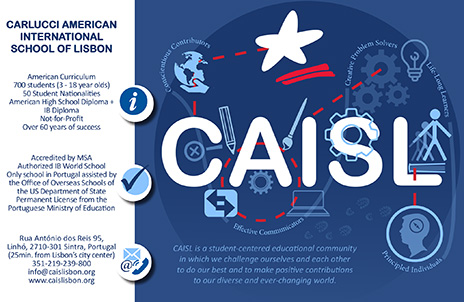2023 Awards for Constructive Dissent
Christian A. Herter Award for Constructive Dissent by a Senior Foreign Service Officer
Mark Evans: Changing the Game for Parents of Children with Disabilities
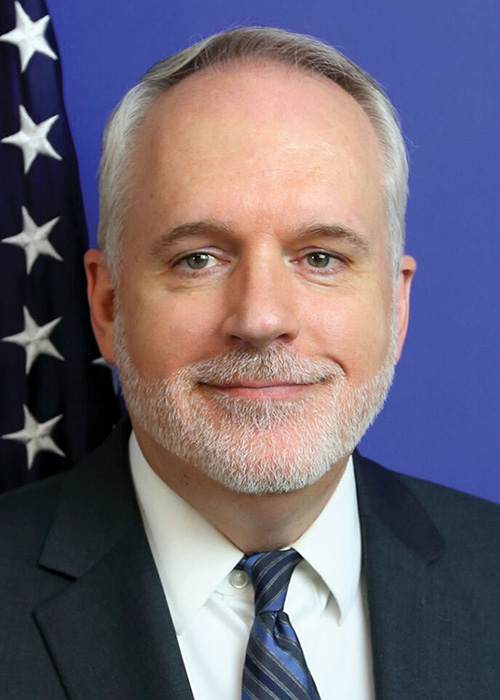
Mark Evans.
For FSO Mark Evans, receiving an AFSA award for constructive dissent represents a somewhat personal victory. Evans and his wife, Kristen, have four sons, two of whom have disabilities. Early in his career, he says, the department was “empathetic and understanding” of the challenges faced by parents like him. But in 2014, he noticed attitudes shifting dramatically.
Anticipating a move to Stockholm for an assignment and figuring out how to meet the needs of their youngest son, who has Down syndrome, Evans “started hearing from other parents in the Foreign Service community that they, too, were running into increasing challenges in accessing support and that those charged with administering the Special Needs Education Allowance (SNEA) were no longer working with parents in a supportive, empathetic manner.” Evans was working to put in place the services his son would need in Stockholm to move successfully, and, he says, when he asked for help, some officials in the Bureau of Medical Services (MED) even “went so far as to insinuate that we were being neglectful parents and were just looking for a way to ‘get to Stockholm’.”
Because of this experience, and in response to a groundswell of complaints from other FS parents, in 2015 Evans created an official employee organization at the State Department: Foreign Service Families with Disabilities Alliance (FSFDA). Now 500 members strong, FSFDA has two goals: to provide a venue for Foreign Service parents of children with disabilities to support each other, and to enable the affected community to advocate for needed reforms with a common voice.
Evans has served as FSFDA board chair since its inception, leading efforts to change State Department approaches to supporting Foreign Service dependents with disabilities. As a result, numerous significant and positive changes have been made, both in the department’s overall attitude to these issues and in the associated regulations.
As FSFDA board chair, Evans engaged directly with department leadership to push for reforms in the administration of SNEA and on associated medical clearance issues. For the first several years, FSFDA’s efforts were thwarted by direct opposition from some leaders within the department who repeatedly rejected reform proposals despite numerous negative consequences to employees, families, and the department: involuntary curtailments when post medical clearances were lifted midtour, breaking onward assignments, and families being forced to separate as employees completed assignments.
Evans was frequently contacted by employees seeking advice about how to resolve issues related to their family challenges. Experiences were so traumatic in some cases that the affected employees resigned from the Foreign Service. Others remained but decided to avoid bidding on overseas assignments until the situation changed.
Given the wholesale lack of responsiveness—and sometimes hostility—of department leadership at that time, Evans encouraged FSFDA members to contact members of Congress and even reporters. Several members of Congress wrote letters expressing concern to the department; articles noting employee concerns appeared in Foreign Policy and The Washington Post. The Foreign Service Journal covered the issue extensively, and Evans coauthored a 2016 FSJ Speaking Out on “Supporting FS Families with Special Needs Children.”
Change is possible. It may take years and only succeed when you find the right allies, but if you truly believe in what you are doing and are stubborn enough to stick with it, things may eventually improve and even get turned around.
–Mark Evans
He worked closely with AFSA leadership in seeking reforms. He also found an ally within the ranks of senior managers in the Bureau of Global Talent Management (GTM).
“That proved to be a godsend,” says Evans. “Working in tandem, we were able to push through numerous, desperately needed changes within the FAM regarding the SNEA program—a clearer definition of what SNEA would provide funding for and how to qualify for that funding, and eventually an appeals process for when funding was denied.”
At GTM’s request, Evans also redrafted extensive portions of 3 FAM governing the provision of SNEA. Those changes, which resolved many employee concerns, were adopted at the end of 2019 despite active opposition from some within the department.
When it became apparent in 2020 that true change couldn’t happen without leadership change in the office governing the administration of SNEA, Evans advocated for this, gathering information to demonstrate the need for new management. Working closely with AFSA, he drafted a memo requesting personnel changes in SNEA administration. AFSA sent the letter to the department with FSFDA’s endorsement and input, and in 2020 the personnel changes were made.
Today Evans continues his work as FSFDA board chair, pushing for further reforms in support of Foreign Service families facing the added challenges that come with raising a child with disabilities in overseas settings. Those efforts include extensive involvement in ongoing diversity, equity, inclusion, and accessibility initiatives. Regulatory and leadership changes brought about by his persistent efforts to challenge the system have contributed to a much more positive, empathetic approach to these issues by current department leadership.
Mark Evans is currently the deputy chief of mission (DCM) in Stockholm. He served as director of the Afghanistan desk from 2020 until 2022, including nearly one year as acting deputy assistant secretary for Afghanistan. He served in Baghdad (twice) and as deputy director on the Iraq desk. Other assignments include Beijing (twice), Stockholm, Oslo, Tokyo, the Operations Center, and as a crisis management trainer at the Foreign Service Institute. Before joining the Foreign Service, Evans worked in the U.S. House of Representatives in leadership offices and as legislative director for a representative from Wisconsin. He holds a B.S. in political science from the University of Utah and an M.A. in international affairs from The George Washington University.
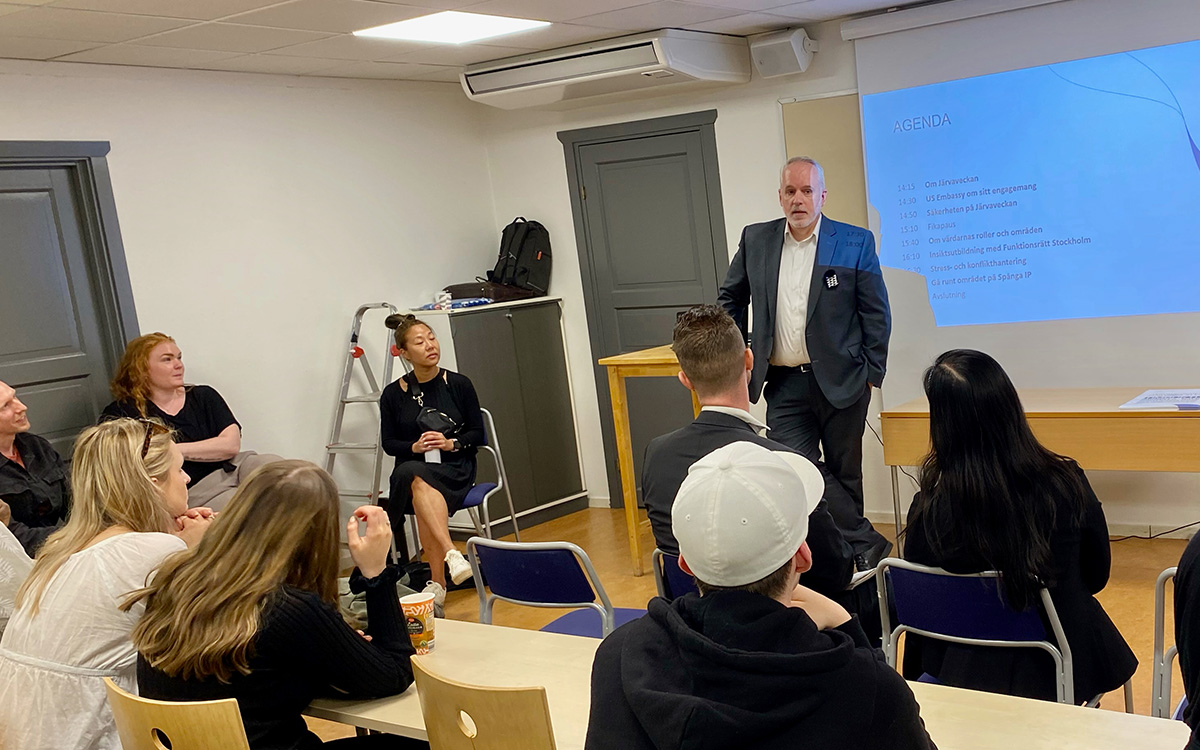
Mark Evans meets with a group of Swedish youth in Stockholm.
William R. Rivkin Award for Constructive Dissent by a Mid-Level Foreign Service Officer
Alexander Douglas: Pushing for Accountability After Attack

Alexander Douglas.
In February 2022, FSO Alexander Douglas displayed remarkable courage after a violent attack on a U.S. Embassy Muscat colleague by a man wielding a knife who had followed the colleague home and tried to kill him. Douglas called on his crisis training to administer first aid, then took the victim to one local hospital and advocated for his transfer to a second in search of emergency care. “Alex saved my life,” the colleague later said.
But Douglas’ heroic actions didn’t stop there. In the aftermath of the attack, he raised challenging questions about the embassy’s security procedures and response, both privately and publicly, working tirelessly to find actionable solutions.
When the embassy presented what he saw as incorrect information at a town hall to brief a traumatized embassy community about the attack, Douglas asked questions. Alarmed by the dismissive response, he put together a detailed timeline of the attack and its aftermath, highlighting deficiencies in the embassy’s standard operating procedures and proposing fixes, such as improved security measures at residential buildings and measures to ensure trauma victims go to the correct hospital. He asked questions, both in writing and verbally, of the embassy’s technical (security and medical) staff and senior leadership.
The attack was a shock to the embassy community, and according to Douglas, “we did not have the procedures in place to react appropriately.” He explained that communications issues with Post 1 and the embassy’s mobile patrol force delayed the latter’s arrival at the scene. It took more than 90 minutes to notify American staff that an attack had taken place, while locally employed staff did not find out until the following day. Also problematic, in Douglas’ view, was that the embassy did not notify U.S. citizens outside the embassy community.
“I was concerned that the embassy’s confidence in its response would prevent us from learning the necessary lessons,” said Douglas, who advocated for improvements in the embassy’s emergency response time and improvements to the way it communicated during emergencies. He also insisted that “people should know they may need to drive themselves to the hospital in an emergency.”
It’s important to recognize constructive dissent because it helps people in difficult situations see that they’re not alone and that they can do the right thing. We don’t have to choose between our careers and our values.
–Alexander Douglas
Douglas was counseled for being “disruptive” and “disrespectful,” and while the embassy ultimately made many of the changes he had pushed for, including making improvements to training and procedures, he felt he had no choice but to curtail from post due to an untenable work environment.
Douglas recently started a new tour as a deputy course coordinator for the orientation course for new Foreign Service professionals at the Foreign Service Institute. He has previously served overseas in Rio de Janeiro and Abu Dhabi. In Washington, D.C., he has served as assistant summit coordinator in the Bureau of Western Hemisphere Affairs, program officer for Haiti in the Bureau of International Narcotics and Law Enforcement Affairs, and Morocco desk officer. Prior to joining the Foreign Service as an economic officer, he worked as a community economic development volunteer for the Peace Corps in Costa Rica.
Alex Douglas grew up in Falls Church, Virginia, and holds a bachelor’s degree from the College of William and Mary in economics and Hispanic studies. He is married with an almost 4-year-old daughter.
W. Averell Harriman Award for Constructive Dissent by an Entry-Level Foreign Service Officer
Christophe Triplett: Fighting for Equal Rights for Locally Employed LGBTQ+ Staff
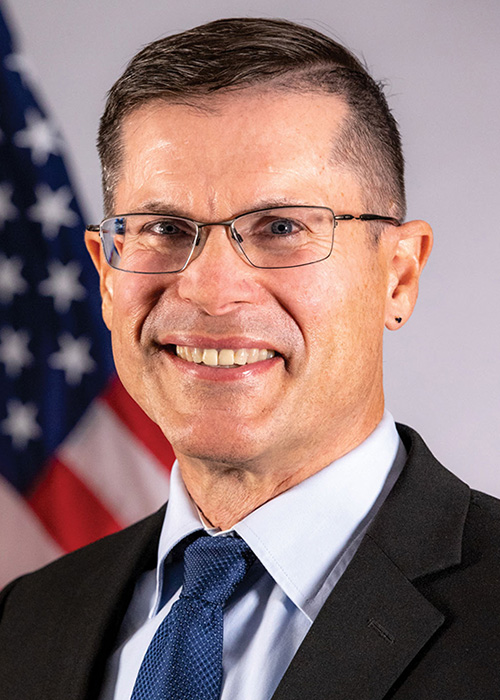
Christophe Triplett.
The vast majority of the State Department’s 50,000+ locally employed (LE) staff worldwide work in restrictive environments for LGBTQ+ persons. Of the 195 countries with which the United States has diplomatic relations, same-sex couples can lawfully marry in just 33. This has meant that the average local employee in a same-sex relationship was excluded from key benefits of the local compensation plan, such as health insurance coverage, death and funeral benefits, and education allowances for their family. Unlike their colleagues, they lived without the assurance that they could support their loved ones through difficult times.
As a first-tour officer, Christophe Triplett took on the procurement portfolio during his second year in Amman. He recognized the inequalities that existed were wrong, and he knew he had to take action to help change the situation. But how? Before asking a somewhat reluctant bureaucracy in Washington to address the issue, Triplett had to prove a change was possible. He started by meeting with members of his own team, who initially had serious doubts. He articulated his case, convincing them of its merits.
“When I first proposed the idea of providing more inclusive health care coverage to the LE procurement team member responsible for major contracts, he explained all the reasons why it wouldn’t work,” said Triplett. “But I advocated for diversity and inclusion, explaining that it aligned with our American values and that we had to at least try to make a difference.”
Once the key team member was on board, he and Triplett engaged with the local health insurance provider, persuading them to extend health coverage to same-sex partners of LE staff members in Amman, despite conflicting cultural norms. Triplett then worked with the local legal counsel and the department’s contracting office to secure their support for this expanded coverage. However, the Bureau of Global Talent Management (GTM) did not let Embassy Amman finalize its solicitation to renew the health insurance contract. GTM insisted that its new standardized and more restrictive language, which prohibited extending coverage to any same-sex partner unless Jordanian law recognized the relationship, be used.
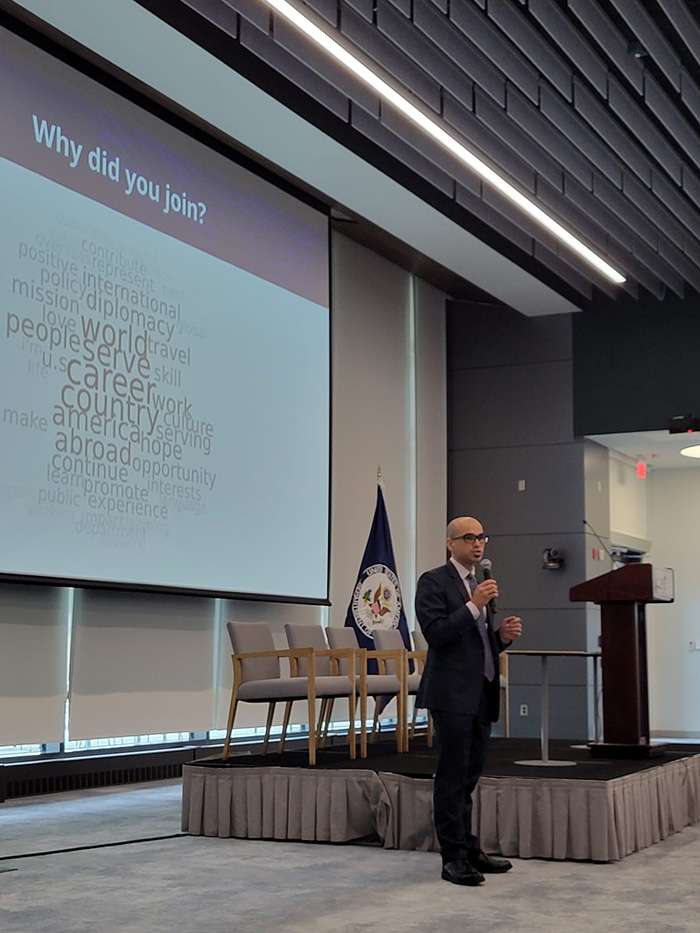
Alexander Douglas addressing the September 2023 Foreign Service orientation class.
Rebecca Sanchez
This setback triggered a four-month period of sustained advocacy. Triplett raised his concerns to embassy leadership, who provided support. He also engaged in numerous late-night phone calls to Washington, D.C., with board members of glifaa, the organization that represents LGBTQ+ employees in the foreign affairs agencies, and the Secretary’s Office of Diversity and Inclusion. These organizations advocated for this issue with GTM and department leaders in Washington. Yet, at each step, officials reiterated that Triplett could not deviate from the global standard.
When some of the department’s most senior leaders descended on Amman for a management officers’ workshop (MOW), Triplett saw an opening.
“As a first tour officer, I didn’t know how anything worked in D.C., but I had the opportunity to collaborate with post management officers from three bureaus to develop the MOW,” explained Triplett. “I talked to some of them about my efforts to try to get a new, more inclusive health insurance policy approved. They were enthusiastic, recommending people that I needed to talk to. We went through the list of attendees and made a plan for me, along with management and HR staff from Amman, to meet with key people who could possibly help bring about change.”
Shortly after those meetings in Amman, Triplett’s vision became reality when the under secretary for management determined it was in the public interest for U.S. missions around the world to treat their LGBTQ+ staff the same way they treat everyone else. Notably, this global solution leveraged concepts straight from the approach Triplett used in Amman. GTM estimated that as many as 80 posts could use this new framework.
Triplett’s journey began with a simple goal—to extend health insurance coverage more inclusively in Jordan. “It hadn’t occurred to me that my work might be relevant to a broader policy discussion,” he said.
Triplett’s dissent directly shaped and accelerated a landmark decision in February 2023 by the under secretary for management. This decision allowed missions, to the extent possible locally, to extend benefits to the same-sex domestic partners and dependent children of LE staff in countries where same-sex marriage is not recognized.
Never underestimate your potential to be the catalyst for meaningful change.
–Christophe Triplett
His persistence had a direct impact on the lives of countless LE staff around the world and guided the department toward a more inclusive and equitable future. He used his role as glifaa post representative to bring his case to anyone who would listen, including the Director General (DG) of the Foreign Service. As his award nominator wrote to AFSA: “It is difficult to imagine a more powerful example of constructive dissent than an untenured, first-tour officer who found the courage to tell the visiting DG that, as an institution, we were not living up to our values.”
Christophe Triplett joined the Foreign Service in May 2020 as a management officer and was part of the first all-virtual orientation class. His first post was Amman, and he is now serving in Mexico City. Prior to joining the Foreign Service, Triplett worked as a management consultant. He holds a B.A. in economics and Asian studies from Arizona State University and an MBA from Nyenrode University in the Netherlands. He is married to Washington Gonzales, who is originally from Brazil.
When sharing or linking to FSJ articles online, which we welcome and encourage, please be sure to cite the magazine (The Foreign Service Journal) and the month and year of publication. Please check the permissions page for further details.




